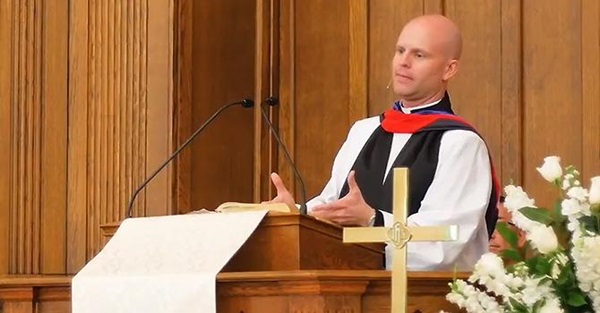The answer depends on congregational and community context and begins with another question: What does the gospel have to say to a broken and brokenhearted world in this moment?
It has happened repeatedly in recent years. On Saturday afternoon, around 3 or 4 o’clock, my phone’s screen flashes alive with a news alert from The New York Times or The Wall Street Journal. Some of the alerts seem trivial, hardly worthy of the title “breaking news.” Others, though, are so staggering that “breaking news” hardly expresses what is world-shaking, gut-wrenching, terrifying and heartbreaking.
I have friends whose anxiety is so elevated on a day-to-day basis that they have disabled all notifications and alerts on their phones. They simply no longer have the emotional or spiritual capacity to process another tragedy, and for them, this disabling is an act of self-care. One empathizes.
For those of us who regularly find ourselves in a pulpit on Sunday mornings, though, this is seldom an available option. If part of the work of preaching is bridging the distance between the world of the Scriptures and our world today, if we are interpreting the meaning and weight of eternal promises for contemporary life, then preachers must at the very least be conversant with the world as it is and as it is becoming -- even as that is unfolding in the moment.
But this raises an inevitable question: When does the preacher change Sunday’s sermon in response to Saturday’s news?
This is a favorite discussion among preachers on Twitter and Facebook on Saturday afternoons when shocking news has yet again broken. Someone tweets or posts, “How are you going to preach about this tomorrow?” Several people then offer constructive suggestions, often with deep insight into Scripture, the tradition or the situation.
Because this is social media, though, it does not take long for the quality of the help and the conversation to devolve. Someone starts preacher shaming: “If you don’t talk about this on Sunday, you shouldn’t be in a pulpit.” Or someone makes an appeal directly to laity: “If your preacher doesn’t preach about this on Sunday, you should find a different church.” Then someone retorts that his or her preaching continually addresses racism or sexism or violence or social injustice so perhaps the “shamer” should just worry about his (it’s almost always a man who first throws shame in these scenarios) own sermon.
In these exchanges, what is inevitably lost is the most significant question: What does the gospel have to say to a broken and brokenhearted world in this moment, and does that gospel message necessitate changing what I had planned to preach tomorrow?
There is no perfect answer, of course. So much depends on our own prayerful and pastoral discernment. So much depends on the congregational and community context.
What I am learning through this extended season of shocking Saturdays is that I have to examine my planned sermon through four questions.
If I do not change a word, will this sermon still speak honestly and sufficiently about the world where this news happened? Does this sermon offer a description of sin and brokenness that can begin to account for pernicious prejudice and pervasive violence? Does the sermon’s description account for “the evil that enslaves us, the evil we have done, and the evil done on our behalf,” to borrow a prayer of confession from the Episcopal Church’s “Enriching Our Worship” liturgical resource? Does it speak to the way the Spirit stirs people to respond generously and self-sacrificially in the most difficult of circumstances? If it does not, then it must be changed.
If I were to change the sermon, would I be offering something other than mere punditry? For better or worse, there is already a Sean Hannity and a Rachel Maddow. My deep conviction is that people do not come to church to hear sermons that sound like the commentary offered by either. In ways deeper than words, people come to church to hear that there is, in fact, a balm in Gilead that can heal the hurting soul. If I do change the sermon, how can I offer that good news in the wake of this news?
Am I the one who can say something about this, or is there someone else whose voice should be heard? As a white man, I already enjoy more than my share of privilege in this country, and to stand in a pulpit regularly is to exercise yet another kind of privilege. In the wake of some Saturdays, the gospel may call me to give up some privilege by letting another voice be heard. The answer may not be about changing the sermon at all but about intentionally giving up the pulpit for a week.
What can be said? Nadia Bolz-Weber may not have been the first to say it, but I heard it first from her: “I only preach from my scars, not my wounds.” Though these Saturdays are coming frequently, they still catch us off guard and they leave us hurting. But the pulpit is not the place for my own therapy or for venting frustrations with mealy-mouthed politicians or complicit lobbyists or a racially bigoted judicial system. What can be said is what is most true, words that come from William Sloane Coffin: “God’s heart was the first of all our hearts to break.”
It will happen again. Pray God, not this week. But some Saturday soon, breaking news will light up my phone, and yours too. The next day, I will step into the pulpit, and you will too. My prayer is that together our words might be a part of how God is repairing what is broken and binding up the wounded.
That would be good news indeed.
This was first published in Faith & Leadership, Aug. 20, 2019, https://faithandleadership.com/nathan-kirkpatrick-when-does-breaking-news-compel-preacher-rewrite-sundays-sermon.

